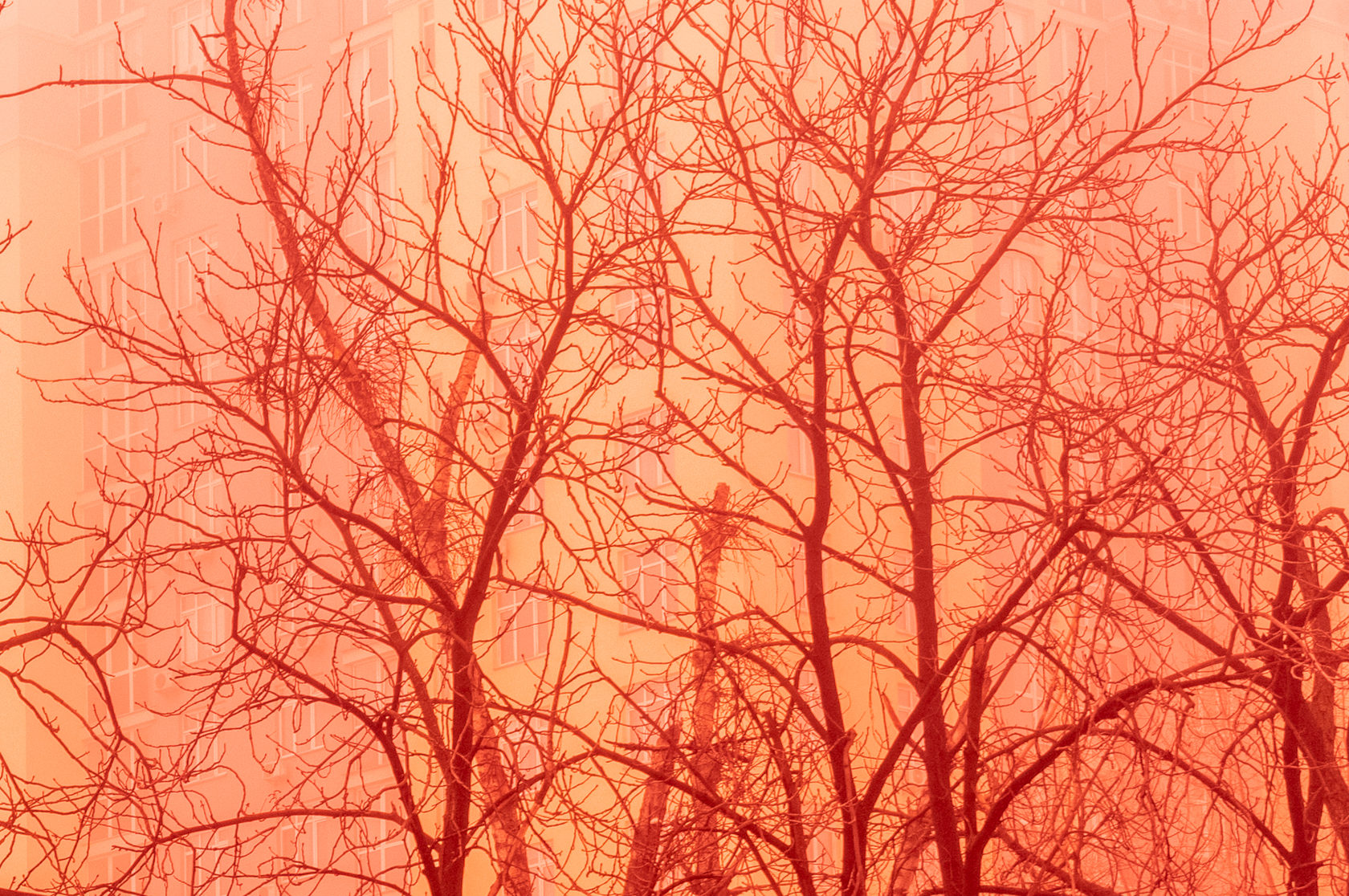The photos have made as part of a group project. It represents an idea of uniting one hundred women photographers from all over Ukraine in
order to visualize what it means to be a woman and your own muse. Is there something more behind a regular selfie? This project reflects the popular interest in selfies as a successful self representation, and also highlights the popular phenomenon as female art.
In the process of working on the self-portrait, I proceeded from the inner sensations of two human aspirations - libido and mortido. Pursuit for life and creation and pursuit for death and destruction. These energies can be directed both at other people or at the environment, and at the person himself. But being conscious and sublimated, they are a powerful fuel for creativity.
The color red that unites both portraits is a symbol of concentration of energy. Its focus depends on the form and content of the image.
order to visualize what it means to be a woman and your own muse. Is there something more behind a regular selfie? This project reflects the popular interest in selfies as a successful self representation, and also highlights the popular phenomenon as female art.
In the process of working on the self-portrait, I proceeded from the inner sensations of two human aspirations - libido and mortido. Pursuit for life and creation and pursuit for death and destruction. These energies can be directed both at other people or at the environment, and at the person himself. But being conscious and sublimated, they are a powerful fuel for creativity.
The color red that unites both portraits is a symbol of concentration of energy. Its focus depends on the form and content of the image.
“The future always looks different to how we are capable to imagine it.”
Stanislaw Lem
Immortality, divinity and paradise have always been in the dreams of humanity as embodiments of eternal happiness. Now, with technological progress reaching levels when war, hunger or plague don’t seem to be unsolvable issues, the man aims even higher. It is now proclaimed that suffering, illness, ageing and death do not have to be necessary aspects of human life. The most important contemporary revolution is not the loss of faith in God, it is attainment of the faith in Human. People have ceased to rely on ‘natural laws’ or holly books. God is dead.
Trans Humanistic ( from Lat. trans— through, through, beyond; home— man) and Post Humanistic philosophical thoughts are based on a concept that evolution of the human has not completed and, with the active use and help of advanced technologies, the human transformation can evolve further into future. They consider the possibilities of enhancement of human intelligence, creation of artificial human organs, the transformation of human body on molecular scale, integration of consciousness with computer, cyborgization and so on. In the end it will lead to the evolvement of a Post Human, with the body and abilities that are different from what we currently know, and also a possibly for immortality.
In this sense the human race is experiencing an era of Ancient with its ideals of beauty, ethics and aesthetics. But instead of perfect and invisible gods that live beside, a man wants to become a god himself.
Undoubtedly it raises many open questions.
How the concept of de-humanisation will affect cultural, spiritual and social life when the resources, impressions and even the universe are limited?
How the appearance of super humans with their exceptional physical, emotional and intellectual abilities will change social order?
Will the post-human be able to preserve his species identification?
And finally, the existence of the death itself is the source of all existential questions of humanity, and subsequently philosophies and religions. If the death will cease to exist, where will we searching for the meaning of life?
Stanislaw Lem
Immortality, divinity and paradise have always been in the dreams of humanity as embodiments of eternal happiness. Now, with technological progress reaching levels when war, hunger or plague don’t seem to be unsolvable issues, the man aims even higher. It is now proclaimed that suffering, illness, ageing and death do not have to be necessary aspects of human life. The most important contemporary revolution is not the loss of faith in God, it is attainment of the faith in Human. People have ceased to rely on ‘natural laws’ or holly books. God is dead.
Trans Humanistic ( from Lat. trans— through, through, beyond; home— man) and Post Humanistic philosophical thoughts are based on a concept that evolution of the human has not completed and, with the active use and help of advanced technologies, the human transformation can evolve further into future. They consider the possibilities of enhancement of human intelligence, creation of artificial human organs, the transformation of human body on molecular scale, integration of consciousness with computer, cyborgization and so on. In the end it will lead to the evolvement of a Post Human, with the body and abilities that are different from what we currently know, and also a possibly for immortality.
In this sense the human race is experiencing an era of Ancient with its ideals of beauty, ethics and aesthetics. But instead of perfect and invisible gods that live beside, a man wants to become a god himself.
Undoubtedly it raises many open questions.
How the concept of de-humanisation will affect cultural, spiritual and social life when the resources, impressions and even the universe are limited?
How the appearance of super humans with their exceptional physical, emotional and intellectual abilities will change social order?
Will the post-human be able to preserve his species identification?
And finally, the existence of the death itself is the source of all existential questions of humanity, and subsequently philosophies and religions. If the death will cease to exist, where will we searching for the meaning of life?
A person dies twice. First time is the physical death itself and the second time is when a memory of that person dies. But how about cities, how does a city die? The noise, scents, faces, the atmosphere - where do they go? Cities are an ever changing living organism, dynamic and vibrant that changes throughout the stages of its life. Its buildings and areas are much like their inhabitants, each with their own story to tell as they are born, develop and ultimately die and new life replaces the old.
There are ghosts in every dying city. They can be seen in reflections, in faded graffiti, in a washing line stretched between the trees and embedded in their trunks. I feel the soul of the city, I see how it dies.
Avarijnyj is an area on the left bank of the river in Kyiv which was originally built by German soldiers held prisoner after WW2. Today, most of the buildings are being demolished and modern high-rises are replacing them.
There are ghosts in every dying city. They can be seen in reflections, in faded graffiti, in a washing line stretched between the trees and embedded in their trunks. I feel the soul of the city, I see how it dies.
Avarijnyj is an area on the left bank of the river in Kyiv which was originally built by German soldiers held prisoner after WW2. Today, most of the buildings are being demolished and modern high-rises are replacing them.
"Language is a process of free creation; its laws and principles are fixed, but the manner in which the principles of generation are used is free and infinitely varied. Even the interpretation and use of words involves a process of free creation." Noam Chomsky- an American linguist, philosopher, cognitive scientist, historian, political activist, and social critic.
The aim of the project is to explorer visual language of artists and to tell classic stories in my own words.
The aim of the project is to explorer visual language of artists and to tell classic stories in my own words.





